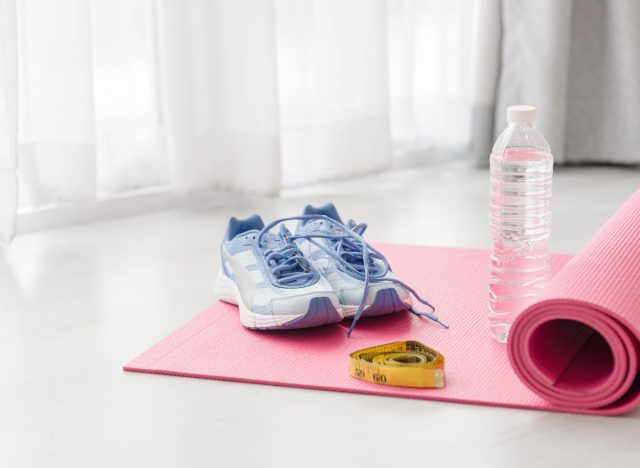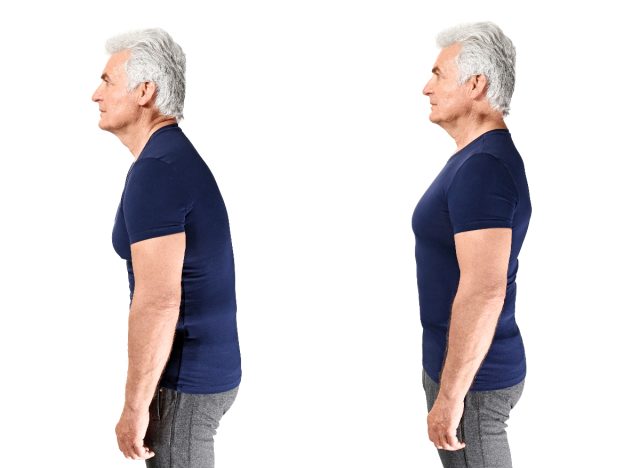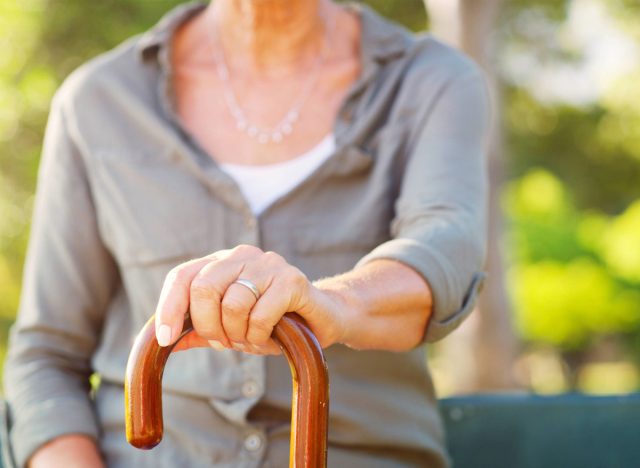Share this @internewscast.com
Balance is more than simply standing on one foot or maintaining stability during physical activity—it’s an essential component of healthy aging that extends to every aspect of life. According to 2023 research, good balance helps prevent falls and injuries, two common concerns as people age. Other research indicates that maintaining good balance supports mobility, independence, and a higher quality of life. It can also improve your posture and coordination, allowing you to keep doing regular daily activities with ease. However, subtle habits that seem harmless could throw your balance off the rails and negatively impact your well-being. That’s why we chatted with an expert who reveals 10 daily habits that destroy your balance so you can address them pronto.
Often, the culprits affecting your balance are habits you perform routinely without a second thought. But the good news is that making small, intentional adjustments to these habits can help get your balance back on track. That’s why we spoke with Mike Masi, CPT, a certified personal trainer at Garage Gym Reviews, who shares 10 daily habits that destroy your balance—and potentially your quality of life.
If you’re ready to get your equilibrium back on track, keep reading for Masi’s list of the 10 daily habits that ruin your balance. And when you’re finished, be sure to check out the 11 Exercises Trainers Over 60 Swear By for All-Day Energy.
You’re sitting too much.

Prolonged sitting can wreak havoc on your balance by weakening core muscles, reducing mobility, and causing stiffness. Furthermore, the Mayo Clinic reports that sitting too much has been associated with a heightened risk of mortality due to cancer and heart disease.
“Sitting in itself isn’t bad for you, but sitting for prolonged periods may weaken the muscles utilized for balance, particularly the muscles around the ankles and hips,” Masi explains. “If you have a desk job or a hobby that requires prolonged sitting, try implementing standing and kneeling positions during work, and break up the monotony of sitting by walking at regular intervals.”
You’re not exercising regularly.

A sedentary lifestyle can cause balance issues, as regular exercise is crucial for maintaining muscle strength and joint flexibility. One study found that exercising regularly improved balance by correcting bad posture.
Masi explains, “Your body is an adaptive machine that responds to the stresses imposed on it. Your balance largely relies on its muscles for support, so any atrophy or lack of use may impair your balance in the long run.”
You’re not maintaining good posture.

Research suggests that poor posture can negatively impact balance by throwing off the body’s natural alignment and increasing the risk of falling.
“Slouching or leaning affects your center of gravity. Like sitting, this usually isn’t a problem unless it becomes a daily habit, which may create adaptations over time that will challenge your balance,” says Masi.
You’re wearing improper footwear.

Wearing shoes that don’t fit properly or provide support can destroy your balance over time. Choose footwear with good arch support and a proper fit to enhance your stability—especially if you spend lots of time on your feet.
“High heels or ill-fitting shoes can impair stability,” cautions Masi. “Try to find a shoe that fits your foot well and is appropriate for your daily activities. Consider using orthotic inserts for arch support if you have flat feet.”
You’re ignoring health problems.

“Your balance is closely tied to your vision, somatosensory ability, and vestibular systems. Any issues with these body systems should be immediately explored and treated if you’re at risk for falls or just want to mitigate your risks for developing balance issues,” states Masi. Additionally, underlying health issues like inner ear problems or neurological conditions can compromise balance.
You’re not drinking enough water.

It’s no secret that staying hydrated is crucial for nearly every aspect of good health, and your balance is one of them.
Masi tells us, “Your body is mostly made up of water. You use the water content from food and drinks to closely regulate your blood volume. Low water intake may lead to low blood pressure, which can cause dizziness and affect balance.”
You’re overindulging in unhealthy food and beverages.

Excessive consumption of unhealthy foods and alcohol can cause weight gain and impair cognitive function, both of which affect balance.
“Overeating and drinking alcohol can cause long-term negative effects on your balance,” says Masi. “Weight management is important considering the link between obesity and diabetes. When high blood sugar persists, it can damage the nervous system, which may affect sensation in your legs.”
You’re skipping meals.

Irregular eating patterns or skipping meals can lead to blood sugar fluctuations that can cause energy crashes and impair your balance.
“Low blood sugar can lead to dizziness, which may create balance issues,” says Masi. “Try to avoid long periods without food if you know you’re susceptible to low blood pressure or blood sugar or if you’re at risk for falls.”
You’re ignoring the side effects of medications.

Some medications can impact your balance due to side effects such as dizziness or impaired cognitive function.
Masi adds, “When taken together, some medications may amplify or attenuate the effects of others. Always follow the advice of a physician when implementing pharmacological interventions.”
You’re relying on support when walking.

While equipment like walkers or canes can provide support, relying too heavily on them may weaken muscles and reduce balance down the road.
“Overuse of assistive devices like canes or walkers may lead to dependency and weaken the muscles in the lower body over time,” says Masi. “If you walk with an assistive device, consider working with a physical therapist to improve your function and decrease your reliance on external assistance.”











